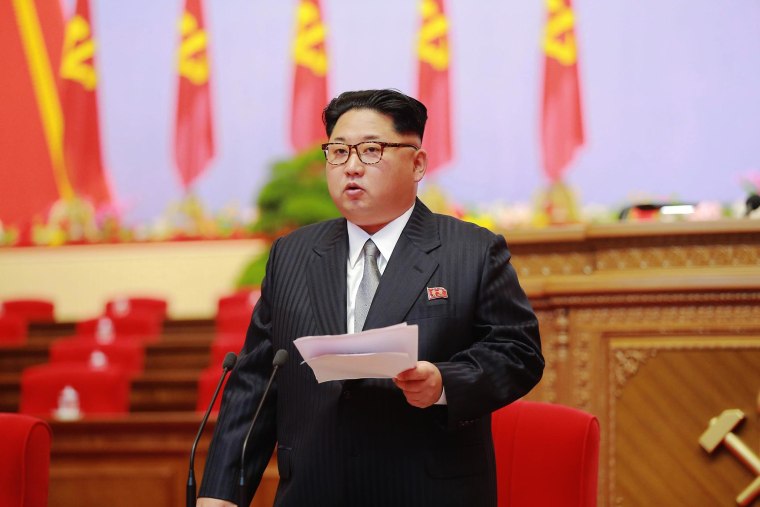PYONGYANG, North Korea — The only predictable thing about the North Korean regime is its unpredictability.
For decades it has tried to keep the outside world off balance. This week's ruling party congress has followed the same uncertain pattern.
The congress — the first in 36 years since Jimmy Carter was president and the Soviet Union alive and well — was designed to solidify leader Kim Jong Un's grip on power and on his party. His grandfather Kim Il Sung was handpicked by the Soviets to run the state at the age of 33. Exactly Kim's age Saturday.
It is a coronation of sorts and on the streets, factory workers, schoolchildren, youth groups and soldiers are rehearsing for the huge parades that will follow the congress.
RELATED: Images suggest North Korea preparing for nuke test, website says
But North Koreans were unaware it had even started on Friday until it was shown on television 12 hours later.
NBC News was invited along with other media to cover the celebrations, but we haven't been allowed inside. Instead journalists were taken to a sidewalk 300 yards from it, a wire factory and a maternity hospital.
And no one knows why Kim called the congress or what he'll say in his major speech — if he delivers one.
Still, an estimated 5,000 North Koreans were there to watch him cement his leadership as he opened the congress in typically defiant mood.
The country is safe with him and with nuclear weapons, he maintained in the short remarks opening the congress.
All of those NBC News spoke with outside the congress professed total loyalty to Kim and his vision.
Pak Doc Ju said he remembered the last congress in 1980.
"Kim Jong Un is the best leader in the world and under his wise leadership, North Korea is the most powerful country in the world," the wiry old man said.
Kim Chun Bok, a 41-year-old homemaker, breathlessly reassured Americans that "thanks to Comrade Kim's leadership the world will live peacefully — he's a peacemaker."
Kim has been called many things by world leaders, but rarely that.
Even his main allies, the Chinese, have lost patience with his repeated missile and nuclear tests. In the last few months alone he has fired missiles from submarines, ships and land, exploded a nuclear bomb and threatened America with war. The UN has condemned him. Under his leadership, North Korea is more isolated, and more dangerous, than ever.
There's no hint of that in his sanitized capital Pyongyang, partly because its people have almost no contact with the outside world.
Here, the government has spent weeks polishing the streets and preparing parades for the political extravaganza they believe showcases what a socialist paradise North Korea is.
No one dares step out of line. The delegates applaud Kim's opening speech vigorously.
They have good reason to — Kim has executed more military leaders in his five years in power than his father or grandfather.
One of those he killed was his uncle, the country's second most powerful man, whom he called "despicable human scum" on state TV. The regime may be the world's only hereditary family dictatorship, but only up to a point.
A relative who could gain by her closeness to Kim is his sister, Kim Yo Jong, who is on the ruling committee and oversees propaganda, who is rumored to be in line for a promotion.
Overshadowing all the rivalries that simmer below the surface of this congress is the possibility of a nuclear explosion.
Based on the movements of men and equipment at one of the country's known nuclear sites, analysts are predicting the launch of a nuclear missile in the coming days or weeks. It would be the fifth such nuclear test by North Korea and would further antagonize both Washington and Beijing, who want nothing more than stability on this fragile peninsula.
"I hate Obama," he said. "If I hit you, it hurts. That's what his sanctions are doing to us. We're united around Kim Jong Un. He's the strongest, most genuine leader in the world."
Then he disappeared into the deep Metro system that doubles as a nuclear shelter. There's no question many here resent America, which North Korea remains technically at war with, as the Korean conflict was stopped by a ceasefire, not a peace treaty. Each of the country's leaders has stoked the fires of hatred for America since U.S. warplanes bombed Pyongyang to rubble.
North Korea leads the world in almost nothing, but in mass displays of loyalty it has no equal.
This article originally appeared on NBCNews.com.
